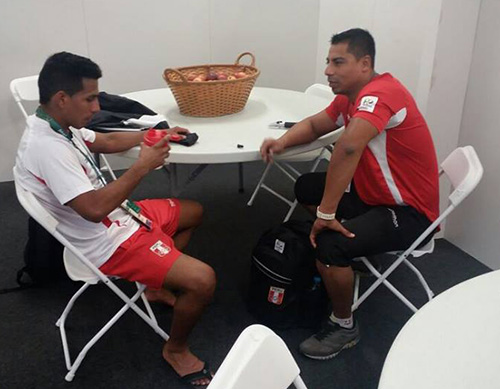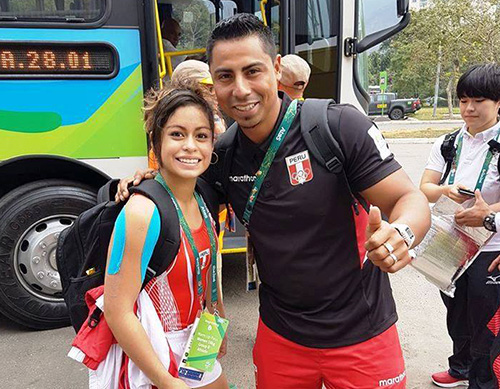
The specific Federations in the Costa Rica Olympic Committee (CON), give us their projections of the athletes with possibilities to classify, defining the athletes with whom I must work and who to follow up on. The general role I carry out with them consists of a first appointment at the NOC clinic where I complete the file with all the personal characteristics, training program , nutritional history and other important data that I need to design the plan to follow. At the CON, everyone in the multidisciplinary team has the philosophy of going out to the field to see the athletes in their environments, so the next thing is to visit them in their training sessions, make sweat rate measurements, see the weather and infrastructure conditions they have and that can affect their nutritional habits. I also monitor what they consume before, during and after their practices so as to develop protocols that are tailored to their tastes and needs. The adherence to the protocol, as well as their reactions to it, are continoulsy monitored in my visits and the pertinent modifications are made. My role also consists of a lot of nutritional education at an interactive level such as visits to the supermarket, cooking workshops, food creation with all involved.
Due to the level of professionalism required by some Olympic Games and the small amount of athletes I had to work with (we had a little more than 30 in the process and 11 already classified), I was able to work individually with each athlete, so I accompanied some at their qualifying tournaments or camps, I saw each athlete at least once a week, and I was in constant communication with all those who were preparing abroad.

It is always a challenge to keep them motivated with the food that the Villa offers because they get tired of the "little variety", in addition to keeping them away from the "nutritional temptations" that they sometimes suffer from anxiety in the face of competition.
FMND: What is the most important advice you gave to the athletes of the Costa Rican Team?They are several, but mainly that they stay focused on their eating plans, that they do not invent anything different or try new things that could generate any energy imbalance, poor recovery or gastric discomfort. The other advice would be to take care of their hydration due to the climate and humidity of Rio.
FMND: Anything else you want to share with us about your experience in Rio 2016?Commenting on the role of sports nutrition in the Games, I know that important progress has been made but it still is not given the necessary importance. In the main dining room, for example, there is a nutritional information booth that nobody visits; nor did I find any congress or other parallel activity like we see in other branches of sports medicine. There is a lack of presence of Latin American sports nutritionists accompanying their delegations and I think it is our responsibility to continue working hard so that they take us into account as essential personnel and so we can play a stronger role in Olympic Games in general.

The nutritional control during training was carried out in the following maner : evaluating and analizing the morphological, hydration, nutritional supplementation and biochemical changes of athletes. The majority of those classified were monitored primarily in the field so that the quantificatin of data is more exact...one important consideration is that some of the classified athelets do not train in Peru, however many of them were advised and monitored virtually.
What has been the most difficult thing you have faced regarding sports nutrition during these Rio 2016 Olympic Games?The eating habits and customs; although the Olympic dining room is very varied, the Peruvian is used to a lot of food variety and different flavors that differ from those found in the town, however the dining room's food was always good. The athlete knows that you mustn't try any new food in the competitive stage, that is why we take great care in the choosing of familiar foods to be consumed by our athletes.

They know that nutrition is trained and that it is a fundamental pillar for the best sports performance; therefore I always tell them that if they want to be champions they must eat like champions.
FMND: Anything else you want to share with us about your experience in Rio 2016?Here in Rio we are now working on competition nutritional support; of the 29 classified athletes we have 14 in track & field , many of them in resistance participations so we are monitoring their level of hydration, urinary density, changes in basal metabolic rate and acidification changes among other interesting data. Glycogen recharging is basic, electrolytic monitoring is always present, weight changes, and those produced by the stress of a competition of this level. Nothing is new, everything that is used is familiar to the athlete. We use minimal supplements ; among the most used are hydration, energy gels, caffeine, glutamine and electrolyte capsules, We try to make nutrition a priority in athletes and they know it. We have had many medals...remember that the easiest way to understand the athlete is to become one with them. The Olympic experience is unique and unimaginable.